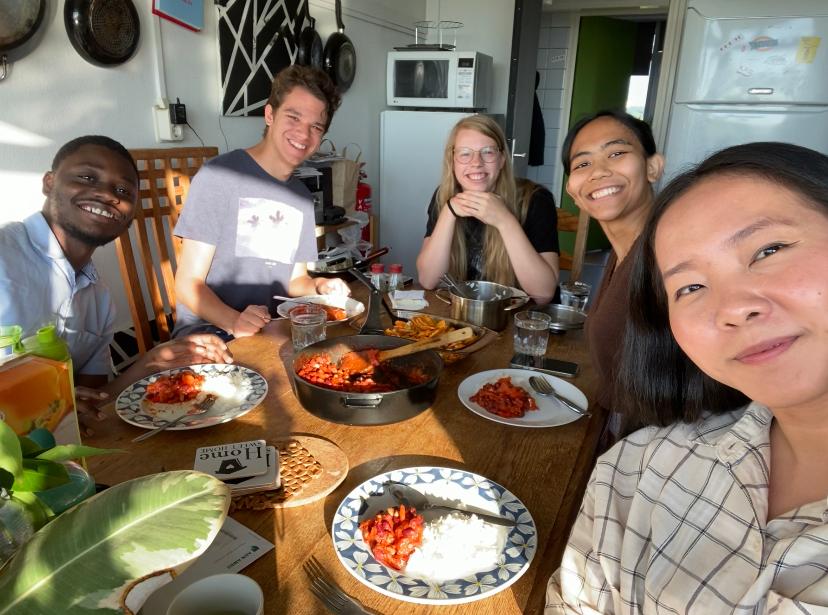My first-year corridor experience
More often than not, the second most important question that comes to mind after sorting out the question of which school you would like to study is where you would live. Living in a nice and serene accommodation contributes immensely to the unforgettable memories we build during our student life. Wondering about what student residence looks and feels like, I am here to share with you my first-year experience of living in a corridor style of accommodation in Wageningen.
How did I choose this place?
Although accommodation can be somewhat competitive, Wageningen university has an arrangement with Idealis for International students from far to get priority in securing accommodation, and I am a beneficiary of this system. Prior to the start of my study in September 2020, I received practical emails from WUR about housing. This great instructional email helped me to register with Room and bid for rooms advertised my Idealis on the platform. There were varying options in terms of accommodation type, but I went for shared accommodation (corridor type), and I got a room in Hoevestein. Hoevestein is one of the few star flats serving as student accommodation. Tenants usually live with about 7 people. While there are more than one corridor-like accommodations in Wageningen, the arrangements may slightly differ from the Bornsesteeg, for example. Please learn more about how to secure accommodation as an international student via this link.
Diversity and flexible arrangements
In my first year, I shared a corridor with 7 students from diverse backgrounds. The nationalities represented were Dutch, Italy, Suriname, and Indonesia. In this multicultural setting, we express our culture in different ways. Culture is displayed through food, music, outfits and speech. I must stress that we all lived amicably and understood each other’s cultural differences. The beauty of living with other people is that I learned how other cultures do their things. This helped me to be more accommodating the more I discovered things about my corridor mates.
In the corridor, we have a shared kitchen, laundry room, toilets and bathrooms. Due to the shared facilities, we shared cleaning tasks equally among ourselves. Cleaning was not a hassle but motivating because we were compensated for the work done. However, these compensations vary per corridor based on what has been agreed upon among fellow corridor mates.
The fun and getting together:
Arriving in Wageningen after the first wave of the coronavirus, social bonding was vital for me to have a great stay since the covid regulations stalled public engagement with visitors. This meant that the only way to engage is my corridor mates. Gladly, we had hallway dinners, which got us together in times of less social interaction with the outside. In the hallway dinners, one or two people from the corridor cook a dish from their home country. Furthermore, we organised bicycle rides to the forest in Wageningen. Some other corridors also organised trips together.
Within the kitchen, I shared dishes, plates, cutleries and other basic kitchen stuff shared among the tenants. In an accommodation like Hoevestein, I did not have to buy a burner since we already have a gas stove with an oven for the corridor. This means you don’t really need to buy these items unless you have personal reasons. Sharing a facility like a kitchen is also a good place to start conversations with housemates. In fact, living together with others also taught me the social skill of being caring and concerned about the collective good of society. While I left with a lot of good memories, we always don’t forget to leave memories of us in the corridor.
It is not abhorred to have friends over and host parties in your corridor. There were several times I hosted my friends to eat, talk and play games. However, prior notice should be given to your co-tenants in order to inconvenience others.
Tips for living in a corridor-like setting:
- I was accommodating to others and initiated conversations, which helped me to get along with everyone in my corridor. This is a very useful tip if you need the help of your corridor mates.
- It is always nice to inform your corridor mates if you will have some friends over (especially when you will be using the kitchen).
- Since you live together with other people, it is good to be mindful of the level of noise you make.
- Since keeping the corridor clean is usually a collective responsibility, it is nice to not skip your cleaning tasks.
- If you are from a culture with a strong sense of community, living in the corridor might be the option to go with.
- You can also learn about Alexander’s experience of living in a corridor in this blog.
Living on a corridor in my first year was the best decision I made, especially because that was a covid peak season. Since I come from a culture with a strong sense of community, the corridor kind of accommodation was the best for me to relive my culture of living as a community. The diverse cultural expressions and the activities I had together with my corridor mates were rewarding experiences for life. I do consider it one I will never forget.




Thanks for sharing your experience. Im currently looking for a housing. So, I would consider sharing a corridor as an option.
Hello Neathan,
thank you for your comment. We are glad you found the information useful.
Good luck with finding your housing!
Margaréta